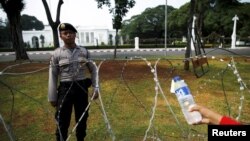Indonesia says it has increased security across the country, following the release of a social media video that threatened attacks against police and other targets.
Officials, who have since blocked the video, say they are investigating if it was released by a domestic terror group allied with Islamic State.
Police Commissioner Mohamad Iqbal said authorities are not underestimating the threat and are tightening the security of police headquarters and other security offices.
In the video, allegedly released by wanted militant Abu Wardah Santoso, a man's voice threatens to fly the Islamic State flag on Merdeka Palace and destroy the Jakarta Metropolitan Police Headquarters.
At his news conference late Tuesday, Security Coordinating Minister Luhut Pandjaitan acknowledged the threat posed by Islamic State.
“Yes, certainly there is a potential ISIS threat. We also have good coordination in handling the probability of ISIS threat,” he said.
Foreign Minister Retno Marsudi stressed the importance of sharing intelligence information with neighboring countries.
“All of us are on the alert. For sure, BIN [National Intelligence Agency] would gather all kinds of information. We have also discussed intelligence information with Singapore," she said.
Indonesia, the world's largest Muslim nation, has been the target of several terrorist attacks, most notably the 2002 Bali bombings that killed 202 people, mostly foreign tourists.
Jakarta has long been campaigning against the threat of recruitment by Islamic State and other groups.
Luhut Pandjaitan said the government is now looking at utilizing religion and culture to combat the threat of terrorism.
“On the issue of the ISIS threat, we or the government rather prefer a de-radicalization method. Because, to date, the Western method is a hard approach. Now we are going to look at it with a soft approach, since the hard approach is unsuccessful," he said.
Hundreds of Indonesians are believed to have left to fight with Islamic State in Syria and Iraq.
This report was produced in collaboration with the VOA Indonesian service.




